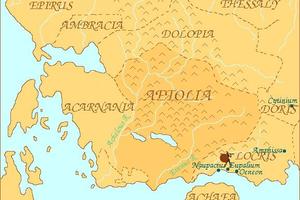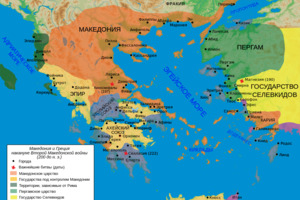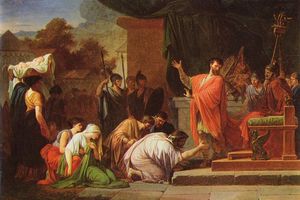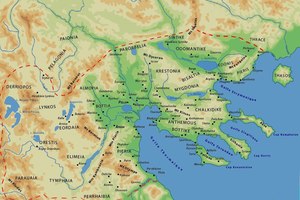Macedonian Wars
The Macedonian Wars were a series of wars between Rome and Macedonia during and after the Second Punic War. As a result of the Punic and Macedonian wars, Rome achieved hegemony in almost the entire Mediterranean basin.
First Macedonian War
The First Macedonian War (214 BC - 205 BC) was a war between Rome and Macedonia. It was fought simultaneously with the Second Punic War against Carthage.
During the war, Macedonia unsuccessfully attempted to take control of parts of Illyria and Greece. It is generally believed that these conflicts prevented the unification of the forces of Philip V of Macedonia and Hannibal in the war against Rome. The war ended in 205 BC with the signing of a peace treaty in Phoenice.
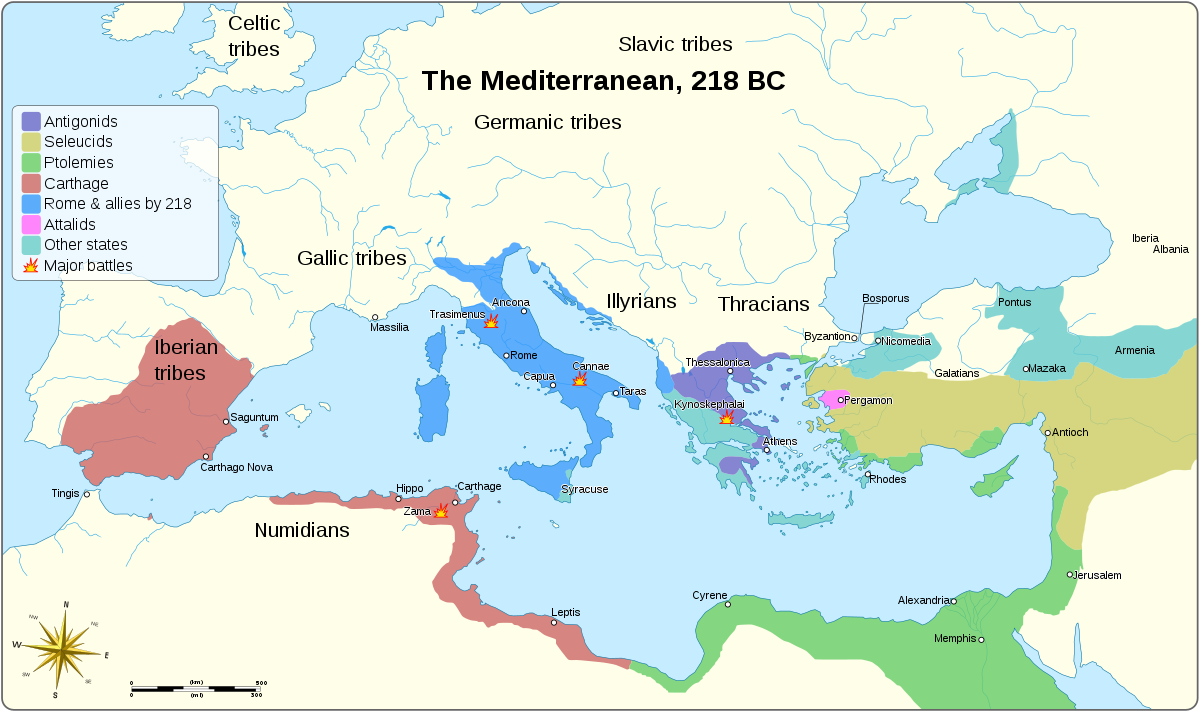 Map of Europe at the beginning of the First Macedonian War
Map of Europe at the beginning of the First Macedonian War
While Rome was busy with the war with Carthage, Philip V of Macedonia decided to take advantage of this and expand his territories in the west. According to the ancient Greek historian Polybius, the main factor influencing Philip to make such a decision was Demetrius of Pharos.
Demetrius, after the First Illyrian War in 229 BC, ruled over most of the Illyrian coast, including the part that was under Roman protection. Nevertheless, in 219 BC, he was defeated by the Romans during the Second Illyrian War and fled to the Macedonian king Philip V.
Participating in the war against the Aetolian League, Philip received news of Hannibal's crushing victory over the Romans at Lake Trasimene. At first, Philip showed the message about this victory only to Demetrius. Apparently, seeing in this event an opportune chance to restore his power over the lost lands, Demetrius advised the young king to make peace with the Aetolians and pay special attention to Illyria and Italy. Polybius, quoting Demetrius, reports:
"And now all of Hellas is already conquered by him, assured Demetrius, and will continue to be: the Achaean out of goodwill, out of inclination to him, and the Aetolian out of fear, due to the failures they suffered in the current war. Meanwhile, Italy, he continued, and the passage to it will be the first step towards the conquest of the entire world, which is more fitting for him than anyone else. Now that the Romans are crushed, a favorable moment for this has come."
As a result, Philip decided to take revenge on Rome and began the war. However, first he had to finish the Social War, which he, together with the Achaean League, led against the Aetolian League. Philip immediately began peace negotiations with the Aetolian League. At the negotiations that took place on the coast near Naupactus, Philip met with the leaders of the Aetolians, and a peace treaty was concluded.
Philip spent the winter of 217-216 BC building a fleet of 100 warships and preparing the rowers. Nevertheless, Philip lacked the resources to create and maintain a fleet that could compete with the Roman one. Therefore, Philip planned to use his fleet not for battle, but for troop transportation and quick deployment at selected locations. However, the desire to avoid a naval battle might have been due to the lack of experience and training of the ship crews. As a result, Philip decided to build lemboi. These were small, fast galleys used by the Illyrians. They had one tier of oars and, in addition to the rowers, could carry up to 50 warriors. With such ships, Philip could hope to avoid or evade a battle with the Roman fleet, which he hoped would be more concerned with fighting Hannibal.
In the meantime, Philip expanded his territories to the west along the valleys of the Apsus and Genusus rivers, up to the borders of Illyria. It is believed that Philip's plan was as follows: to establish control over the coast of Illyria, conquer the lands lying between the coast and Macedonia, and use the conquered lands to create a faster supply and troop transport route through the narrow straits, into Italy.
At the beginning of the summer, Philip, at the head of his fleet, left Macedonia, passed through the Euripus Strait between the island of Euboea and the region of Boeotia, rounded Cape Malea, and dropped anchor in the waters of the islands of Kefalonia and Leukas, awaiting news about the location of the Roman fleet. Having learned that it was still in Lilybaeum, Philip sailed north to Apollonia in Illyria. However, when the Macedonian fleet was near the island of Sason, Philip received a report that some Roman quinqueremes were seen heading towards Apollonia. Convinced that almost the entire Roman fleet was coming for him, Philip ordered to lift anchor immediately and return to Kefalonia. Polybius, describing the hasty retreat of the fleet, speaks of a "panic" and "disorder", and also says that the Romans sent a squadron of only ten ships, and that due to an "unfounded alarm", Philip missed the best chance to achieve his goals in Illyria, and although he returned to Macedonia "without losses, but not without disgrace."
Upon learning of the Romans' defeat in the Battle of Cannae in 216 BC, Philip sent his envoys to Hannibal's camp in Italy, with the aim of concluding an alliance. In the summer of 215 BC, an alliance, the text of which is given by Polybius, was concluded. It generally speaks of mutual support, the parties promise to be enemies of each other's enemies (except those with whom they had friendship treaties). The treaty talks about supporting each other in the fight against Rome, also the treaty mentions that in case Rome wishes to conclude a peace treaty with Hannibal, it must renounce its power over Corcyra, Apollonia, Epidamnus, Pharos, Dimale, Parthini, and Atintania, and also transfer "to Demetrius of Pharos all his subjects, as many as are within the boundaries of the Roman state."
The treaty outlined by Polybius no longer mentioned Philip's invasion of Italy, which could have been due to Philip's reluctance to risk it again after the fiasco at the island of Sason, or because Hannibal may not have wanted it. However, on their way back to Macedonia, Philip's envoys and the accompanying envoys of Hannibal were captured by the Romans. They were captured by Publius Valerius Flaccus, who commanded the Roman fleet patrolling the southern coast of Apulia. The agreement was found in Hannibal's letter to Philip.
Philip's alliance with Hannibal caused terrible anxiety in Rome, which was already in a dire situation. It was decided to equip and send twenty-five more ships to the fleet of twenty-five ships commanded by the prefect Publius Valerius Flaccus and send them to Tarentum. Furthermore, Publius Valerius was instructed not only to guard the coast of Italy, but also to ascertain Philip's intentions, and if it was determined that Philip was indeed striving for war, in this case, it was necessary to try to keep Philip within the borders of his kingdom.
At the end of the summer of 214 BC, Philip, at the head of a fleet of 120 lembi, again tried to invade Illyria from the sea. He managed to capture the poorly defended city of Oricus, after which, leaving a small garrison there, he sailed up the Aoos River to besiege Apollonia. Meanwhile, the Roman fleet moved from Tarentum to Brundisium and continued to closely monitor Philip's actions. The command of the fleet and the legion transferred to him for reinforcement was entrusted to the propraetor Marcus Valerius Laevinus. Having received news from Oricus about events in Illyria, Laevinus, at the head of his fleet and army, crossed the border. Landing near Oricus, Laevinus took the city in a light skirmish.
According to the version provided by Titus Livy, Laevinus, learning that Apollonia was besieged, sent 2000 soldiers to the aid of the city under the command of Quintus Naevius Crista. Landing at the mouth of the river, Crista managed to bypass Philip's troops and enter the city unnoticed at night. The following night, suddenly attacking the Macedonian camp, he managed to catch Philip's forces off guard and forced them to abandon their camp. Learning of the defeat of the Macedonians, the Romans brought their fleet into the mouth of the Aoos River and blocked Philip's possible retreat by sea. In order to save himself, Philip decided to return to Macedonia through the mountains, leaving behind the fleet, which he ordered to be burned before retreating, thousands of killed or captured, along with all the property of the army. Laevinus and the fleet he commanded stayed to winter in Oricus.
Having suffered defeat twice in attempts to invade Illyria by sea, and also being held back by Laevinus' Roman fleet in the Adriatic Sea, Philip dedicated the next two years, 213-212 BC, to preparing an invasion of Illyria by land.
Second Macedonian War
Between 218-201 BC, Rome claimed victory in the Second Punic War against Carthage and heightened its policy in the Balkans. Meanwhile, in the eastern Mediterranean, Macedonia and the Seleucid state began dividing spheres of influence. As a result, a secret treaty was signed between Philip and Antiochus III in 203 or 202 BC for the partition of the overseas territories of Egypt, which was at the time in decline. However, the signatories did not trust each other very much.
In 202 BC, the Macedonian king embarked on a campaign in Asia Minor, where he began attacking Pergamum and Rhodes in addition to the Egyptian territories. Attalos I, the ruler of the Pergamon Kingdom, intensified efforts to form a coalition against Macedonia with the participation of Aetolia and Athens, and Roman envoys also participated in the negotiations.
In Rome itself, there were many opponents of conducting wars outside Italy, especially among large landowners. After the Second Punic War, the people also did not yearn for new bloodshed. Attitudes were changed through active agitation and propaganda, threatening an invasion of the Macedonians into Italy itself. First, the Senate issued an ultimatum to Philip, referring to the offenses committed against Pergamum, and sent an embassy to the East, which visited a number of Greek cities. Then the embassy visited Philip, who was besieging Abydos, and formally declared war on him.
The Second Macedonian War began in 200 BC and lasted until 197 BC. Rome managed to strengthen its influence in Greece. The decisive factor was the Aetolian League joining Rome's side in 199 BC and the former ally of Macedonia - the Achaean League - in 198 BC. Macedonia's resources were depleted, opposition against the king was growing inside the country, and the war with Rome was unpopular. Philip V's attempts to make peace with Rome were unsuccessful. In July 197 BC, the Macedonian troops were defeated at Cynoscephalae.
As a result, a truce was concluded for 4 months, later followed by a peace treaty under the following conditions:
"Philip is to pay 1,000 talents of contribution (500 - immediately, the rest - equal contributions over 10 years), and an additional 200 until the treaty is ratified by the Senate. The king's son, Demetrius, goes to Rome as a hostage, a renunciation of all conquests, withdrawal of military contingents from Greece and surrender of the fleet except for five ships, return of prisoners, hostages, and defectors. The Macedonian army was reduced to five thousand soldiers, it should not have war elephants, Macedonia does not have the right to declare war without the consent of the Senate. Pergamum received war elephants and the island of Aegina, Rhodes - Stratonikeia and other cities of Caria, which previously belonged to Philip, Athens - the islands of Lemnos, Imbros, Delos, and Skyros."
The text of the peace treaty was finally approved in Rome, and its implementation was entrusted to a Senate commission of 10 people, together with Flamininus. The moderation of the treaty was due to the Senate's concern about the actions of another Hellenistic monarch - Antiochus III, against whom the Macedonian king could be useful in the future. At the same time, unrest began in the Greek cities due to their desire for independence, and a wave of slave revolts rolled across Italy.
One of the conditions of the treaty was the proclamation of the "liberation" of Greece, which Flamininus personally announced at the celebration of the Isthmian Games in 196 BC. After this, the Senate commission took up the political organization of Greece, changing the state structure and borders of individual states.
Third Macedonian War
In 179 BC, King Philip V of Macedonia died, and his son Perseus came to power. Perseus married Laodice, daughter of Seleucus IV, King of Syria, increased the size of his army, and allied himself with Epirus, some tribes of Illyria, and Cotys IV, king of the Odrysians. He also reestablished old connections with Greek city-states. As the ruling oligarchic circles of Greek states stood for supporting Rome, Perseus turned to democrats. The king announced that he intends to restore the former power and prosperity of his dominion. This policy received support among Greek cities, which did not want to submit to Rome.
Rome was very concerned about the danger that Perseus might be able to destroy Roman influence in Greece and restore the former supremacy of Macedonia among Greek city-states. King Eumenes II of Pergamum, who hated Macedonia, accused Perseus of violating the terms of the Roman-Macedonian peace agreement. The Romans, frightened by the shift in the balance of power in the region, declared a new war on Macedonia. Unprepared for the ensuing war, Perseus began to hesitate and missed the time to win over all of Greece to his side. As a result, Roman diplomacy ensured that the Greeks, who hated the Romans, all provided auxiliary troops. Only a few insignificant Boeotian cities remained on the side of Perseus.
The beginning of the war proved fortunate for Perseus. In the battle at Larissa, he was able to defeat the army of Publius Licinius Crassus, but due to the interference of Quintus Marcius Philippus, who assured Perseus that Rome did not want war and proposed negotiations, he lost time and allowed the Romans to retreat calmly to the sea. As the victor, he offered peace to Rome, but this proposal was rejected. There began to be problems with discipline in the Roman troops, and the Roman generals struggled to find a way to successfully invade Macedonia. Meanwhile, Perseus defeated another Roman army stationed in Illyria. At the same time, he attempted to conquer Pergamum, but this attempt was unsuccessful. In 169 BC, Quintus Marcius Philippus, now serving as consul, crossed Olympus and invaded Macedonia. However, his army was too exhausted from the difficult journey, and Marcius avoided a decisive battle. Finally, in 168 BC, the command of the Roman army was given to Consul Lucius Aemilius Paullus - an elderly man, but one known for his firm spirit, honesty, and incorruptibility. He quickly restored discipline in the troops and, as a result of successful operations, pushed Perseus out of the mountain passes.
On June 22, 168 BC, a battle took place near the city of Pydna that decided the outcome of this war. The battle began with a rapid attack by the phalanx, which crushed the Roman legions and put them to flight. However, during the pursuit through mountainous terrain, the phalanx formation was broken, and the regrouped legions, cutting into the phalanx, killed almost all the Macedonian army in less than an hour. Additionally, the defeat of the Macedonians was facilitated by the fact that their strong cavalry, which could have turned the tide of the battle, for unclear reasons, barely took part in the battle. The Macedonians lost up to 20,000 men killed, and 11,000 were taken prisoner.
Perseus fled the battlefield among the first, but soon, abandoned by all his supporters, was forced to surrender to the Romans and died a few years later in prison in Alba.
As a result of the war, Macedonia, as a state, was destroyed. On its former territory, the Romans literally implemented the policy of "divide and rule": Macedonia was divided into four regions, resembling republics or city unions, modeled after the Greeks. Between them, the Romans forbade any economic, political, and even family contacts: marriages and property acquisition could only take place within one region. These "republics" were not allowed to have their own military forces. Only in the north was a military contingent retained for protection against barbarians. They were also taxed in favor of Rome to the extent of half the tax they had previously paid to the king. The same policy was implemented by the Romans in Illyria, whose king was an ally of Perseus.
All former Macedonian royal officials were expelled to Italy and death was the only punishment for their attempt to return home. In Greece, all former supporters of Perseus were subjected to brutal persecution, many of them were executed. The Epirus Alliance, which supported Perseus, was disbanded, and Epirus, on the order of the Roman Senate, was devastated and completely destroyed, with 150,000 Epirotes being sold into slavery. Meanwhile, the large Molossian tribe that had dominated in Epirus was completely enslaved.
But even Rome's Greek allies did not receive the desired rewards, since from now on, the Romans only recognized complete submission to themselves.
Fourth Macedonian War
Greece lived in peace for almost two decades until a rebellion broke out in Macedonia under the leadership of Andriscus, who declared himself Philip - the son of King Perseus and the Syrian princess Laodice. Supported by Thrace, as well as Byzantium and a number of other cities, Andriscus (Pseudo-Philip) occupied Macedonia, attracting the majority of the country's population to his side, and invaded Thessaly. A Roman legion sent to suppress the uprising was destroyed. Rome sent against Andriscus a new army under the command of Quintus Caecilius Metellus, thereby starting the Fourth Macedonian War. Acting more through bribery than force, the Romans defeated Andriscus's forces in 148 BC. Andriscus's second campaign also failed, and he himself was captured, paraded through Rome during Quintus Caecilius Metellus's triumph, and executed. In 143 BC, the Romans also quickly suppressed the movement of Pseudo-Philip II.
Since then, Rome did not leave this region, founding the provinces of Macedonia, Achaea, and Epirus. In response, the remaining free Greek city-states, which were part of the Achaean League, revolted against the Roman presence. The Achaean League's forces were completely defeated at the battle of Leucopetra on the Isthmus, the League itself was disbanded, and as a punishment, the Romans completely destroyed the ancient city of Corinth in 146 BC - the same year Carthage was destroyed.
Results
The defeat of Macedonia in the wars with Rome is explained not so much by the greater combat effectiveness of Roman legions compared to the unwieldy phalanx and the purely military superiority of the Roman army over the Macedonian in general, but by the systemic crisis of the slave economy of Macedonia. Significantly depopulated as a result of the outflow of population to the East during the Greek-Macedonian conquest of Asia, as well as the wars of the Diadochi, Celtic invasions, and continuous wars, Macedonia could do little against Rome. The defeat on the battlefield was also preceded by a diplomatic defeat in the intricate politics of the Balkans and the Eastern Mediterranean. Weakened Macedonia could no longer be the power that could protect the interests of the ruling class against the backdrop of growing social struggle, and therefore the eyes of slaveholders both in the cities of Greece and Asia Minor, and even in Macedonia itself, turned to a new force - Rome. Surrounded by enemies from all sides, exhausted by wars and depleted, Macedonia suffered a logical defeat.
The Macedonian Wars ended along with Greece's loss of independence.
Similar topics
Roman Republic, First Punic War, Second Punic War
Literature
- Titus Livy. Istoriya Rima ot osnovaniya goroda [History of Rome from the foundation of the city], Moscow: Nauka Publ., 1994, vol. 3, 768 p.ISBN 5-02-008995-8.
- Paul Orosius. History against the pagans. - St. Petersburg: Oleg Abyshko Publishing House, 2004. - 544 p. - ISBN 5-7435-0214-5.
- Edouard Will. L’histoire politique du monde hellénistique (Editions du Seuil, 2003 ed.) Tome II, pp. 121—178
- Green Peter. Alexander to Actium, the historical evolution of the Hellenistic Age, 1993 pp. 305—311
